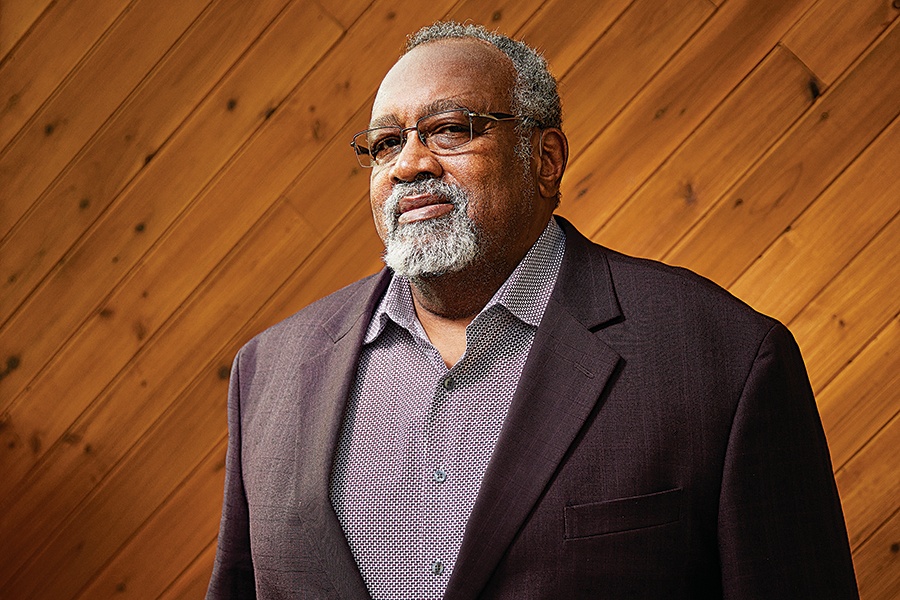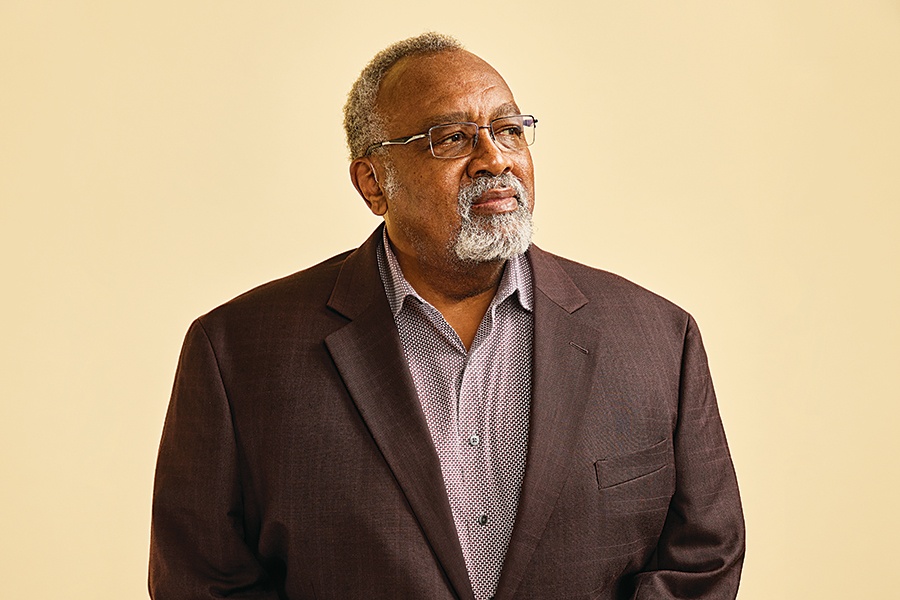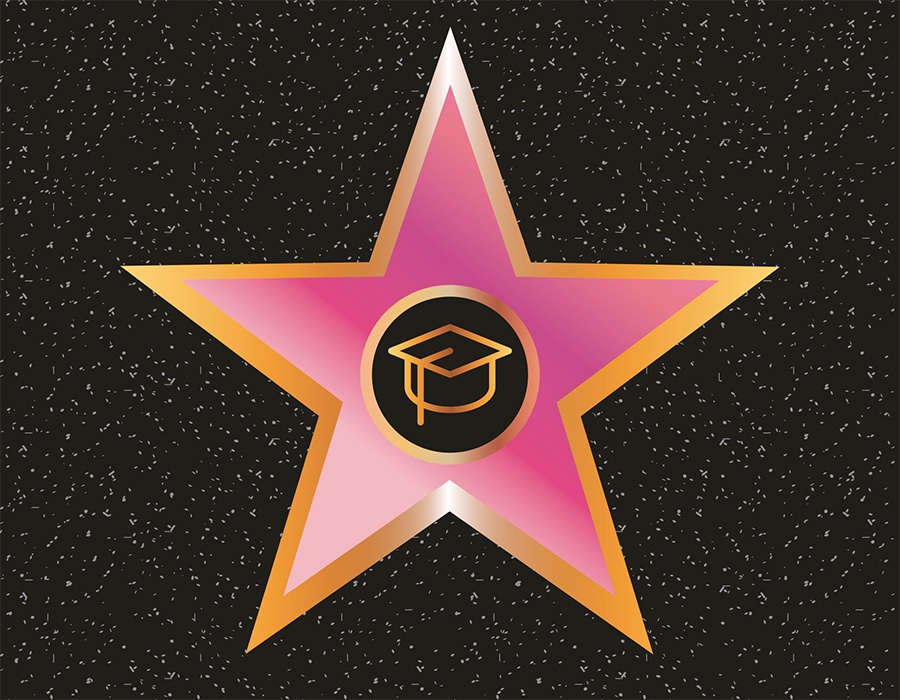The Interview: Brown University Professor Glenn Loury
Brown University professor Glenn Loury has a few things to say about race and culture in Boston and beyond.

Photo by Ken Richardson
Noted economist and academic Glenn Loury, who is best known for talking politics and social policy, finds himself in the limelight these days thanks to his outspoken and often controversial stances on identity politics, the Black Lives Matter movement, and cancel culture. Somewhat of a rarity as an unabashed Black conservative, the former Harvard University professor hosts The Glenn Show on YouTube, writes a newsletter on Substack, and found himself as a guest on Tucker Carlson Today discussing “whiteness” in America. Late in 2021, as students prepared to head home for the holidays, he sat down to chat about a future post-racial America, his own self-loathing, and being the object of Carlson’s affection.
We recently had the chance to elect our first Black mayor in Boston and didn’t. Many people saw this as a lost opportunity. What do you think is the importance of having a Black mayor?
I’m not sure it matters at all. I think what matters is competent governance by somebody who cares about the people, including the struggling people who don’t have enough and who have to send their kids to public schools that might not be working that well, who are worried about safety in their communities, and worried about economic development. Some of those people are Irish. Some of those people are Italian. Some of those people are Black. What you want is somebody who’s not corrupt, who can get trains running on time, who can keep all the balls in the air in a modern city, and who can be responsive to the people. I don’t care what color that person is.
You lived in Boston for many years. What was your favorite part of the city?
I like the Esplanade. I like riding my bike along the Charles River. I like going to the Huntington theater. The restaurants. Jamaica Plain. The Arboretum.
While you lived here, you spent a lot of time in some less touristy parts of the city during a period of great personal difficulties. What about those places?
Don’t make me talk about this, please. [Laughs.] I knew the gritty underside of Boston pretty well when I was out there carousing and drugging and whatnot. But I am not going to tell you I didn’t like Dudley Square [now known as Nubian Square]. I used to go and play chess there with Eddie. He’s been dead now for 15 or 20 years. He was a Black guy, a vendor, and he played chess with anybody who’d come by for a buck a game. And I loved that guy. But then right around the corner was the Orchard Park housing project. In the late ’80s you could get anything you wanted over there. I knew the ins and outs of Orchard Park, and the Dominican guys who were selling the cocaine that I was having a problem with. I knew those guys pretty well. The red light districts. Stuff like that.
You made a name for yourself in the 1980s as someone who said a problem in the Black community was not just the external racism, but what you called the “enemy within,” which included violence, single motherhood, and absent fathers. Meanwhile, you had children out of wedlock as a teenager and you were using drugs. There is a saying that the personal is political. For you it seems the political was personal. Is that right?
In retrospect, I see those two phenomena interrelating with one another. Is it possible that my own self-hatred or self-contempt, in the face of my flaws, foibles, and sins, was being projected on to my people?
That’s what I was wondering.
What a horrible thought. It is one I will have to explore. Here’s the thing: I identified being authentically Black with being able to change my clothes, turn my hat to the side, and go down there to Dudley and hang out and cop and go into those clubs, and pick up, and do these so-called “ghetto things” because I came up in Chicago and had the code-switching skills. I could go down there and not get robbed, and no one would know that I was a professor at an Ivy League institution. And I confess to you here that it may be that I was countering the alienation from the Black elites that chaffed at me so much by being able to get down and dirty with the folk in ways that I thought my liberal detractors at Harvard would never be able to do. They wouldn’t last five minutes in the Orchard Park housing project. They’d be seen as marks before they even stepped out of their BMWs.

Photo by Ken Richardson
In the mid-1990s, you had something of an about-face, criticized Charles Murray for his book The Bell Curve, denounced Dinesh D’Souza, and broke away from conservatives. What happened?
I was emotionally raw. I had come through this midlife crisis. I moved from Harvard to Boston University. I was getting back on my feet. My marriage survived, my young family was coming along, I joined the church, and, in a way, I wanted to rehabilitate myself with the liberal and Black communities. I became estranged from my conservative friends. That carried on for 15 years until Michael Brown, Black Lives Matter, and racial reckoning, when I reverted.
What do you think we are getting wrong with regard to race in the current moment in this country?
I’m not saying we are a colorblind society, or that race is over and we should just move on. I think the challenges that are confronting us are largely not 20th-century, anti-Black racism challenges, but they are 21st-century development challenges. It is not the bias against Black people that is the issue, but the development of our potential. The playing field is not perfectly level, but it’s pretty darn level. A lot of people think that it’s a kind of anti-Black racism to say that we should get beyond race. I think we’re going to get beyond race one way or another. There’s so much interracial marriage, so many multiracial people, and there’s so much churning and dynamism. There are more Hispanics in the country than there are Blacks. The Asian population has grown. An Asian woman is the mayor of Boston. Everyone is on the move. It’d be much better if we had a social safety net so that everybody who had a need for healthcare, whose kids were not getting properly educated, who wasn’t sure about where the next meal was coming from was being properly taken care of in our society. I think that’s the right goal.
What’s the downside of also focusing on identity politics?
The current moment—as reflected in Ta-Nehisi Coates’s Between the World and Me, Ibram X. Kendi’s How to Be an Antiracist, and all of these diversity, inclusion, and equity initiatives, and a lot of the talk about white supremacy and white fragility—I worry about it. I think that the potential for backlash must not be underestimated, and I have been saying this for a while in the speeches I give. You might think you’re winning the argument because everybody kind of nods and goes along with diversity training and with affirmative action, but I’m not sure everybody is really on your side here. And I think that’s why things happen like Republican Glenn Youngkin winning that gubernatorial race in Virginia.
You don’t support reparations. Why?
Not because I don’t think history is complex, or that Black people have not been all together fairly treated. That’s certainly true. But because I think the way forward for the country is through having policies that help our people, not cutting a separate deal for Black people, not by putting Black people off to the side vis-à-vis America and then engaging in a bargaining enterprise that commodifies an obligation that really should be indefinite and unbounded. The obligation is to take care of our people who need support, who need help, who need a positive path in their lives, and there are plenty of poor white people as well.
What are you concerned about in terms of academic culture?
The university has to be a place where people are free to discuss controversial ideas. If students say you can’t have a pro-Trump rally at the university because Black kids are made to feel unsafe by that, that’s horrible. I mean, Trump is a bad guy. Okay, let’s debate it. You don’t proscribe a discussion because you have some trump card of a microaggression that you pull out to stop an argument. Astronomer Dorian Abbot from the University of Chicago was coming to MIT to give a lecture, but he said some stuff in Newsweek about affirmative action that some people didn’t like. They canceled his lecture. Ray Kelly was appointed New York City police commissioner by Michael Bloomberg, a guy who was elected three times to be mayor. That’s a democratic process. And Ray Kelly can’t speak at Brown University because he’s in favor of racial profiling? I don’t support racial profiling. But I worry for the future of my university.
You have had Charles Murray and Cornel West on your show. There are not a lot of people who can say that.
I don’t think there is anybody who can say that. I’m trying to set a model of intellectual integrity, and a kind of open-mindedness. It’s about ideas, not about my team is winning, your team is losing. I think Cornel West is a great man, larger than life, and he’s a man of the left—I’m not. So it was important to me for my own sense of racial identity to be able to converse with Cornel in a constructive way, and to be affirmed to an extent that he respects my independent engagement with questions even though he and I may disagree about them. I’m not going to call Charles Murray a great man, but I think he’s a significant chronicler of American social life. It was basically an anti–cancel culture move. I was saying: The guy has a new book out, let’s deal with the book.
You appeared on Tucker Carlson’s show. I watched some of it and he acted unlike I have ever seen him before—giddy as a schoolgirl. What did you think?
I endorse your description. I wouldn’t have thought to say it, but I agree with you that he was effusive in his praise and was slightly awed in my presence. The brother is going to blow a gasket one of these days. He’s a very, very angry dude. But that Tucker didn’t show up for my interview, and I’m very grateful for that. He wasn’t an attack dog. He didn’t try to put words in my mouth except for a couple of times. He let me say what I wanted to say. I do not feel used, which was the main concern of the people who cautioned me against going on the show. So I got the best out of it. I got exposed to his audience. After the show aired, I saw a discernible increase in my followers on Twitter and subscribers to my newsletter. I got to tell my story about my life, in my terms. And I think I survived Tucker Carlson without getting much damage to my reputation.
Your thoughts on Donald Trump?
I was wrong about Trump. I have a friend, a political scientist, and he was constantly saying to me that Trump is an existential threat to the public and that he doesn’t have the character for the presidency, that he’s somebody who won’t be bound by a sense of commitment to the democratic project that we’ve got here, and that he is in it for himself. I didn’t see that. But when he refused to step aside and has continued to cast the outcome of that election into doubt, and invited his numerous followers to stand apart from the civic enterprise that we’re all engaged in, petulantly questioning the legitimacy of the election, that is very bad. Bad man, bad man, Trump.
You still have many years ahead of you, of course, but how would you like to be remembered?
I’d like to be seen as the guy who was courageous enough to call them the way that he saw them. And who was honest enough to admit when he was wrong.

Photo via Getty Images
A-List Academics
A peek at how local scholars have transcended the Ivory Tower.
71
Number of books by MIT linguist Noam Chomsky that are not about linguistics.
20
Number of documentary films Harvard professor Henry Louis Gates Jr. has made.
1
Ranking held by Heather Cox Richardson, a history professor at Boston College, for political newsletters on Substack.
6
Number of times former Harvard professor Cornel West has acted in a movie or TV show, including appearing in The Matrix and on 30 Rock.
2
Number of times Harvard psychology professor Steven Pinker has been a finalist for the Pulitzer Prize.


